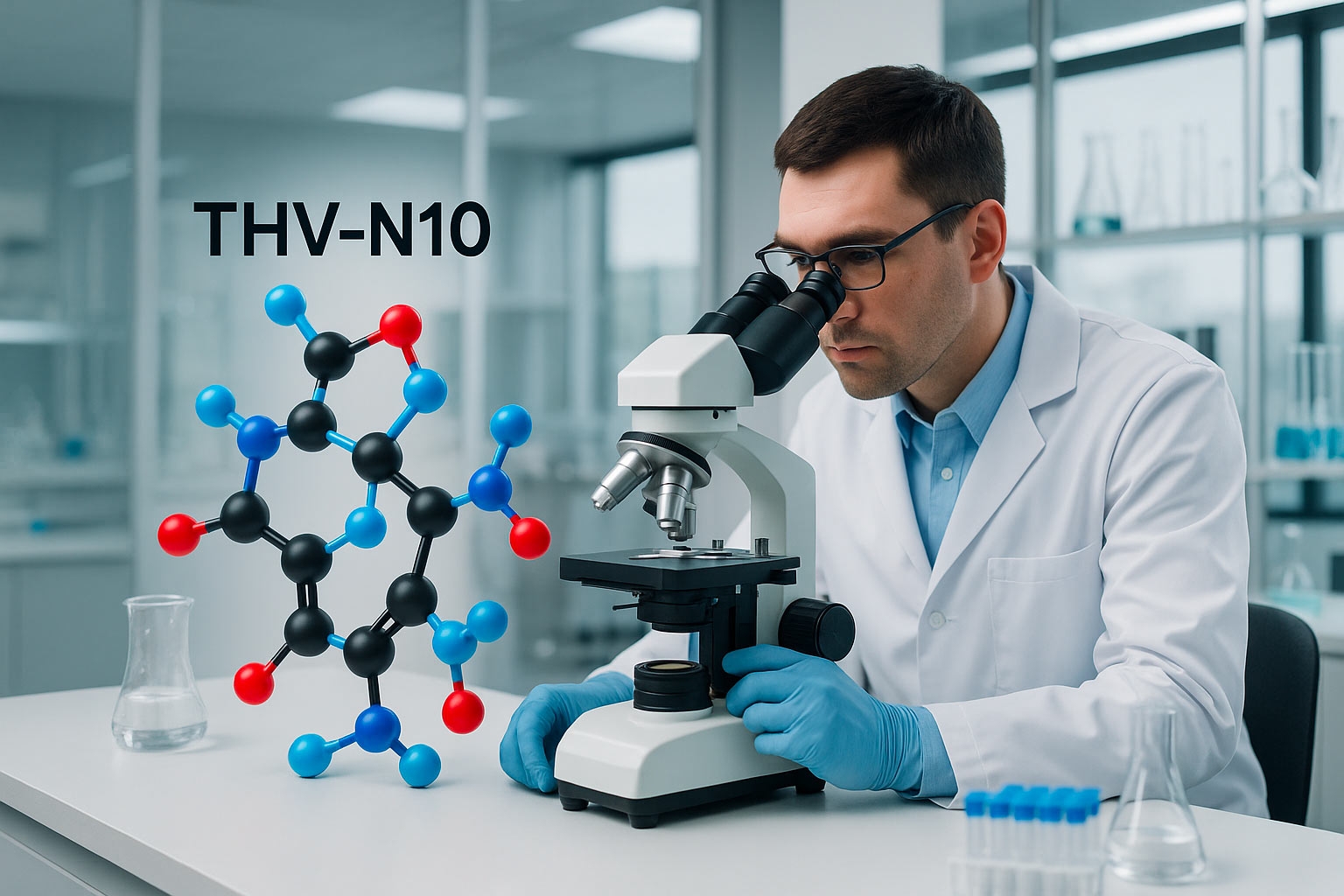THV-N10, a dangerous molecule soon to be banned?

THV, a powerful synthetic cannabinoid
THV-N10 is making headlines: presented as a “new generation” cannabinoid, it is said to be close to tetrahydrocannabivarin (THCV) while being synthetic (or semi-synthetic). In other words: this is not a simple natural hemp extract, but a modified compound designed to produce “THC-like” psychoactive effects.
Unlike CBD, which is non-psychoactive, THV-N10 is promoted for its “powerful” effect, sometimes compared to delta molecules close to delta-9-THC. The problem? We lack perspective: few peer-reviewed studies, marketing labels (THV+, THV-N10) not always aligned with transparent chemical composition, and products consumed in many different forms (gummies, vape, resin, “infused flower”). In short: caution is advised.
Definition of THV-N10 (tetrahydrocannabivarin)
THCV is a natural “varin” cannabinoid found in the cannabis plant. THV-N10, however, is presented as a variant linked to this family: same universe, not the same molecule. It is neither delta-9-THC nor CBD. The molecule is not documented as such in official texts; it mainly appears in commercial listings. Hence the importance of not confusing the two: THCV (natural, some uses explored) ≠ THV-N10 (synthetic derivative, poorly documented).
Differences with CBD and other cannabinoids THV+ and THCP
- CBD: non-psychoactive, legally sold if the THC in products remains ≤ 0.3%. Nothing to do with a psychotropic substance.
- THV+: vague marketing label; depending on the brand, this may refer to blends containing THV-type derivatives. Without analysis, it is impossible to be sure of the composition.
- THCP, HHC, H4CBD, 10-OH-HHC: these are other neo-cannabinoids (often synthetic) that have already attracted the attention of authorities due to their potential danger and psychoactive/psychotropic effects. Several have been classified as narcotics in France. THV-N10 falls into the same risk zone: reported “strong” effects, but limited public data.
Key takeaway: the further we move away from classic phytocannabinoids (CBD, CBG), the greater the health and regulatory risk.
Is buying THV-N10 in France legal?
The law on THC in France
The French framework is simple in principle: THC (delta-9-THC and its isomers) is a narcotic. Production, sale, purchase, use: prohibited except in very tightly regulated medical cases. For hemp products, the well-known rule remains the same: THC ≤ 0.3% in the finished product (a threshold that prevents any notable “high” effect).
Since 2023, authorities (notably ANSM) have stepped up monitoring of synthetic cannabinoids and have classified several molecules (e.g., HHC, HHC-O, HHC-P, etc.) as narcotics due to reports of adverse effects. Updates occurred in 2024 and 2025: the trend is clear, anything that mimics delta-9-THC and causes marked psychoactive effects, especially when synthetic, is under scrutiny.
And what about THV-N10?
As of today, THV-N10 is not explicitly mentioned in the most well-known decisions.
That does not mean “legal” as in “green light”: any preparation must remain free of classified substances and ≤ 0.3% THC. If a neo-cannabinoid is deemed dangerous or too close to a narcotic molecule, its classification can happen quickly.
In practice, we are dealing with an unstable grey area: what seems “OK” today can be banned tomorrow (as happened with HHC).
Our recommendation: consider THV-N10 as legally risky and subject to change. Do not rely on a simple “legal” label on a product page.
In what forms can THV be consumed?
What is seen on the market:
- Gummies (candies): easy to buy online, masked taste, but delayed onset → frequent overdosing.
- Vape / e-liquids: ready-to-use cartridges, sometimes cut with solvents; highly variable quality.
- Resin / hash and “infused” flower: cannabis (or hemp) matrices soaked with synthetic compounds; without serious analysis, it is impossible to assess the actual composition.
In all cases, without an independent analysis certificate (actual contents, solvents, heavy metals, by-products), consumers are flying blind.
Can consuming THV-N10 be dangerous?
Yes, potentially. Signals gathered from related families (HHC & co.) show a risk profile that may include: tachycardia, hypertension, anxiety/panic, vomiting, dizziness, seizures, loss of consciousness. This is not a simple CBD product: this is a psychotropic substance. And since the exact composition varies from one brand to another, the effect can be unpredictable — even more so in gummies (delayed onset) or in vapes (rapid onset).
- Avoid in cases of cardiovascular/psychiatric history, ongoing treatment, pregnancy/breastfeeding.
- Avoid any product without analyses (independent laboratory) detailing: delta-9-THC, THCV, solvents, pesticides, metals, synthesis residues.
- Do not drive: driving under the influence of a narcotic is punishable; tests may come back positive depending on exposure.
- Do not mix (alcohol, other psychotropics) and never consume alone.
- Start low, go slow… then reconsider whether the product is worth it at all.
Conclusion
THV-N10 checks all the boxes of a synthetic cannabinoid to be handled — at best — with gloves: little experience, little public data, a claimed psychoactive effect, and French law tightening against “new THCs.” As long as its status is not clarified and its safety is not established, we remain in a high-risk grey area: health-wise (variable composition, possible incidents) and legally (rapid changes, products reclassified, 0.3% thresholds, and narcotic bans).
If you are looking for a non-psychoactive alternative, turn to quality, lab-tested CBD that complies with the French framework. For everything else, our position remains unchanged: it is better to abstain.
